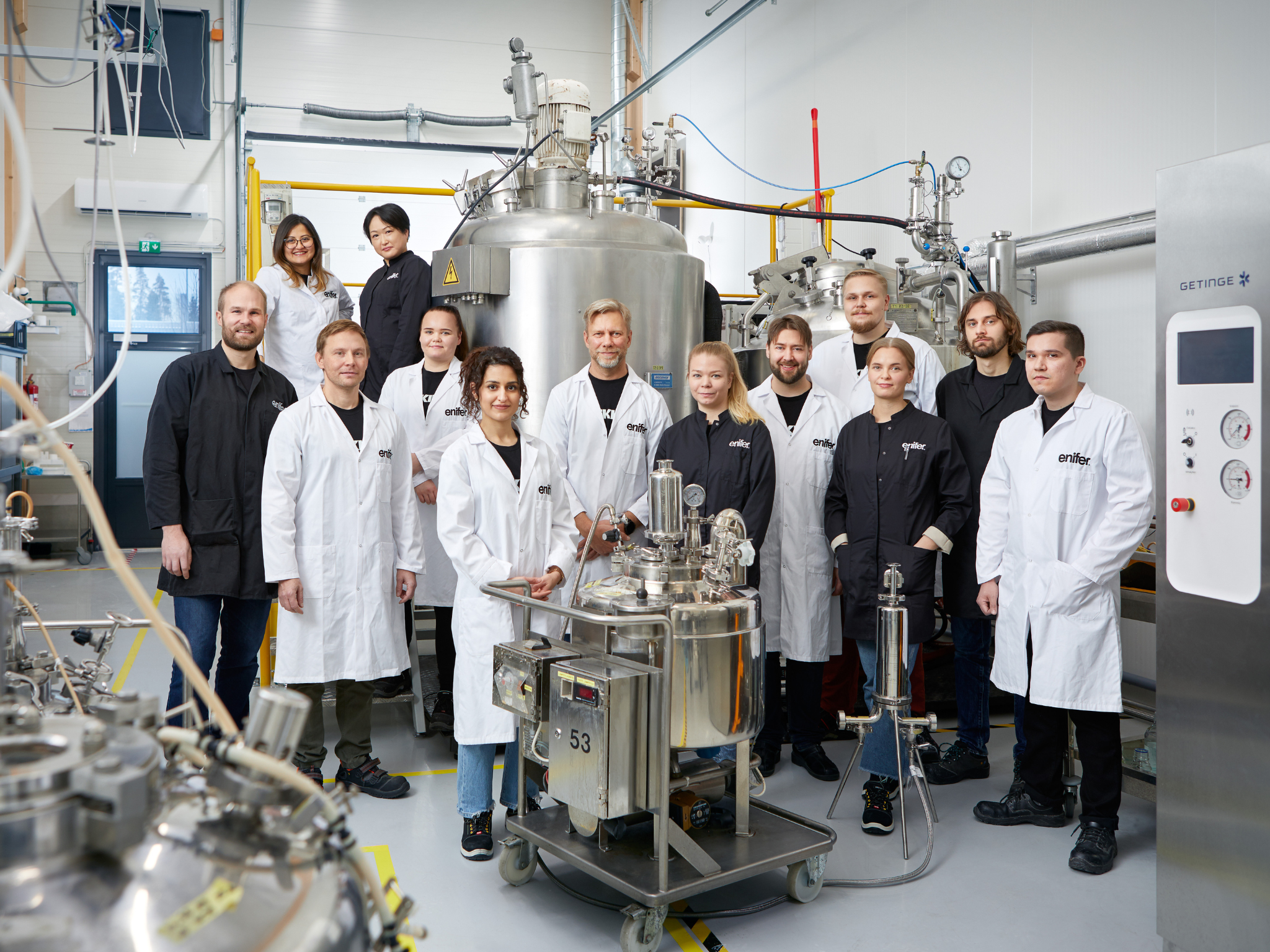
Finnish food tech startup Enifer has secured self-affirmed GRAS status for its Pekilo mycoprotein ingredient in the US, and will begin operating a large factory in Finland next year.
To commercialise a modern version of a 20th-century fungi protein, Finland’s Enifer has been cleared to sell its powdered Pekilo ingredient in the US.
The startup has self-affirmed its ingredient as Generally Recognized as Safe (GRAS), after a review by an independent panel of experts. It paves the way for Enifer to sell Pekilo to US food manufacturers for use in meat and dairy alternatives, baked goods, snacks, and other applications.
The Finnish firm will also notify the Food and Drug Administration (FDA) of its GRAS determination, in pursuit of a ‘no questions’ letter. Though self-determination enables companies to commercialise, the FDA letter is deemed a more robust approval that further breeds consumer and market confidence.
Notifying the FDA is optional for now. That will change next year when the government scraps the self-affirmation rule, as directed by health secretary Robert F Kennedy Jr, making it mandatory for new ingredients to go through full FDA review.
Enifer CEO Simo Ellilä confirmed that the company had started the process of obtaining the FDA letter. “While self-GRAS allows sales of our ingredient in the US, we believe that the ‘no questions’ letter from the FDA will be important in the long run, especially when working with some of the larger CPG groups that we hope to have as our customers,” he told Green Queen.
“Over the years, we’ve already had the chance to work with some of these companies and see the extremely rigorous and lengthy internal evaluation processes they have in place – and you want to make their lives as easy as possible if you want to make it onto their approved suppliers lists.”
The long history of Pekilo mycoprotein

A spin-out of the VTT Technical Research Centre of Finland, Enifer’s Pekilo mycoprotein derives its name from the fungal strain Paecilomyces.
“This strain was originally selected from among more than 300 fungi and used for mycoprotein production for feed applications in Finland between 1975 and 1991,” said Ellilä. During this time, the fungi were fed on byproducts from the forest industry. As this sector advanced technologically, these sidestreams disappeared.
Enifer revived the process by adapting Paecilomyces to food and agricultural sidestreams to develop food-grade mycoprotein. “Besides standard glucose, we can use byproduct sugar streams from the food industry as feedstock for our fungus,” said Ellilä.
“It has a long history of safe use and heaps of scientific literature from that era to support its safety. We think this makes assessing the product’s safety easier than when dealing with a completely novel strain,” he added.
The startup employs a continuous submerged fermentation similar to brewing soy sauce. “After fermentation, most of the water is removed from the mycelium mechanically. Unlike most other companies, we then dry and mill the product into a fine, shelf-stable powder,” Ellilä explained. “We have, of course, a lot of our own ‘secret sauce’, including some innovative approaches to minimising water use in the process.”
The resulting ingredient is rich in digestible protein and dietary fibre, with a neutral taste and colour and strong water-holding capacity. “These properties complement soy and pea proteins, giving food makers new flexibility to develop plant-based products that deliver better texture, nutrition, and overall consumer appeal,” the CEO said.
The five-year-old startup currently markets Pekilo for three industries: pet food (where its protein content is over 60%), aquaculture feed (up to 65% protein), and human food (up to 50% protein).
Enifer plans Series C raise after factory opening

“We’re currently in the process of narrowing down on the most promising applications for early adopters because Pekilo is truly beyond just a protein ingredient – it does boost the nutritional value in both protein and fibre. So we do see it having positive attributes in several different applications,” noted Ellilä.
“We do see a lot of potential in, for example, healthy snacking, where Pekilo’s neutral taste and dollops of high-quality protein and fibre make for an appealing combination.”
He added that the mycoprotein could also be used in blended meat products, since Pekilo is a shelf-stable, cost-efficient drop-in ingredient: “Considering that it is sold as a fine powder, it is probably better suited to applications in sausages, nuggets and the like.”
Currently, Enifer operates a pilot line that produces five to 10kg of Pekilo per day, and periodically runs campaigns with contract manufacturers at 10 times that capacity. It is now set for a big increase.
In 2024, Enifer secured €36M through Series B funding, state-backed loans, and EU grants to build a commercial-scale mycoprotein factory in Kirkkonummi, Finland (set to cost €33M). Construction is expected to be completed by the end of the year, allowing the firm to produce 3,000 tonnes annually.
“We are set to complete our first commercial-scale production unit in Finland in the first half of 2026, with a capacity of 500 kg per hour,” said Ellilä. Enifer’s factory will produce enough mycoprotein to meet the protein needs of 40,000 people in a sustainable manner – 1kg of Pekilo only emits 1.66kg of CO2e, 98% lower than beef and half as much as milk production.
Once it’s up and running, the company plans to kick off a Series C fundraise. “We are ready with the detailed investment plans for the next stage in our global roll-out. Time-wise, this will likely occur in Q4 2026,” he confirmed.
Slow EU regulation led Enifer towards US launch first

“While the facility is built to food-grade specifications, in its first years of operation, it will primarily serve the pet food industry, while we seek additional regulatory approvals and build up traction for the food-grade ingredient,” said Ellilä.
“We’ve been working closely with the food industry since we decided to start developing a food-grade mycoprotein ingredient way back in 2021. It’s been a constant back-and-forth trying to make sure that our production process and product meet the demands of future customers.”
The cost of the ingredient is not set in stone yet. As Ellilä explained: “The product will be priced in the same range as conventional protein sources used by industry today, but it is not a one-to-one replacement for any existing ingredient. So pricing will take into consideration the value that the ingredient can bring to recipe formulations.”
Enifer has also applied for novel food approval in the EU, Singapore and the UK. The European Food Safety Authority’s (EFSA) regulatory framework, however, is amongst the world’s most rigorous. The complexity and timelines involved have spurred many companies to look to other markets first, although recent announcements are designed to simplify and fast-track approval for food tech startups.
“The EU is our home market, and when going for novel food approval for our ingredient, the EU was our first target. We filed our application in October last year and passed EFSA’s first stage of evaluation (the eligibility check) in short order,” said Ellilä.
“But since the beginning, we had decided that we would use the extensive safety data we had generated to pursue regulatory approvals in other key jurisdictions, and the US is obviously the biggest market,” he added. “The slowness of the EU novel doods framework didn’t determine our application timelines, but it might end up impacting where we start commercialising.”
Speaking of the US, Ellilä detailed the timeline for the FDA’s ‘no questions’ letter: “In general, the FDA has 270 days to evaluate our dossier, with possible clock stops extending the timeline. Currently, we expect to obtain the letter during the first half of 2027.”
The post With New Factory in Sight, Enifer Cleared to Sell Mycoprotein Powder in the US appeared first on Green Queen.
This post was originally published on Green Queen.